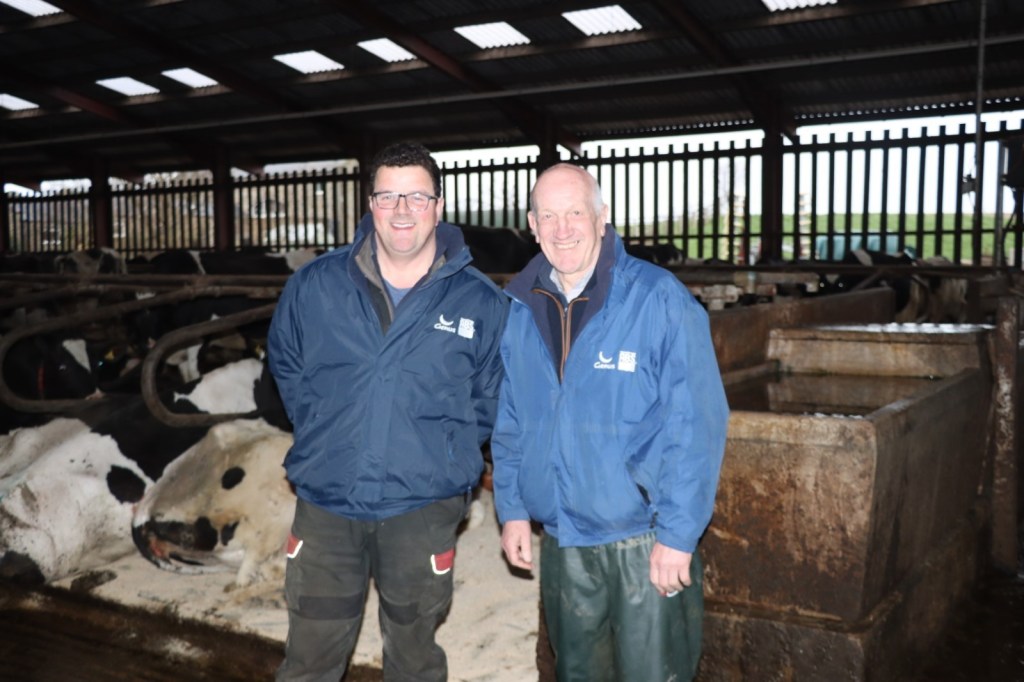Chimney Barn Farm, based in Yorkshire, follows a beef on dairy strategy utilising sexed genetics and a robotic milking system.
John Walmsley, who operates a family farm in Yorkshire, milks 210 cows through four Lely robots which were installed within the past 2 years.
When changing the milking system from a 15/30 swing over parlour to robots, the herd were brought inside and are now housed all year round. Since implementing this change, John has found that the herd are less stressed and more settled. Prior to moving to this new operation, the cows would go out to graze and would experience major grazing quality challenges and fluctuation in milk production.
Since introducing the robots, milk production has increased by four to five litres per day to an average of 37 litres of milk per cow with each cow being milked 3.2 times a day. All milk on the farm is sold to Paynes Dairies.
Using a sexed genetics on a robotic herd
Since they began following a sexed and beef strategy three years ago, the herd at Chimney Barn Farm have seen great success. To maximise their genetic potential, they use Sexcel® sexed dairy genetics on their top performing females and NuEra™ Beef Genetics on their lower performing animals, to help ensure every pregnancy has value and a profitable future.
To ensure that dairy is being bred to their most elite cows and heifers, John has been genomic testing each of his animals through Genus ABS’ breeding programme GENEadvance with his colleague, Hayley, for the last four years.
Once they had made the leap to sexed and beef, John questioned why they hadn’t made the change sooner and hasn’t used conventional semen since.
When selecting which bulls to breed to their animals, they put trust in their Genus ABS Genetics Specialist Colin Lucas, who sorts through which sires are available and compares them against the customised genetic plan he creates for the farm. Once a year John will sit down with the genetics team at Genus ABS to discuss their breeding programme and goals of the farm to make sure everything is aligned.
They employ a 100% Homozygous Polled strategy in their Sexcel dairy genetics program, aiming to breed medium-sized cows with longevity and a minimum £400 PLI threshold for all females.
Selecting the best beef genetics to use
When it comes to breeding for beef, they use NuEra™ Beef Genetics, specifically using the renowned Skaill Dalton on their heifers or first-lactation cows. When asked why they use these genetics, John said it was the easy calving traits of the Angus, which is best for the well-being of their animals.
For their other cows, they typically use British Blue genetics, specifically Croftends Monty, after two to three insemination attempts with sexed semen.
The beef calves on the farm are sold at eight to 12 weeks to three different buyers who will go on to finish them.
Just recently, John was invited to trial the new male beef Sexcel® sexed beef semen to guarantee more money from their beef. Since using it, he said he would definitely use it again, adding: “A Friesian bull calf is a thing of the past now.”
Analysing the fertility of the robotic herd
For any dairy farmer, good fertility is the key to production and profit. Lucky for John, his herd have great fertility which allows them to breed 40% of them to sexed genetics.
They need 65 replacement heifers per year and are culling the same amount. Currently, they are focused on breeding replacements through their maiden heifers and leaving more cows to beef.
All heifers in the herd are served to sexed genetics for the first two inseminations and then to beef.
The strong fertility performance of the herd has resulted in a level amount of milk being produced for the business. At the moment, they aim to breed 25 replacements a month to keep it even all year round.
To ensure all cows and heifers are artificially inseminated at the most optimal time, Chimney Barn Farm have been utilising the Reproduction Management Services provided by Genus ABS since 2009. This system of chalking and breeding has worked very well for the farm, minimising the risks of missed heats and securing them a pregnancy rate of 29%.
If you too are interested in adopting a new strategy, get in touch with your local Genus ABS representative today.






